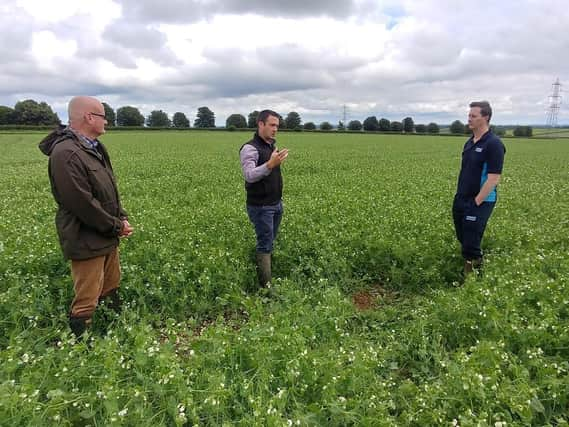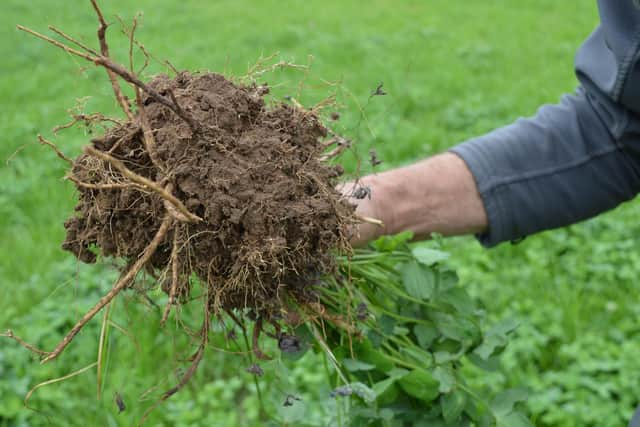Farmers in East Yorkshire take part in a joint project to help the environment and food security through 'rainforest' cover crops


The Sustainable Landscapes Humber project is a collaboration between farmers, Yorkshire Water, Birds Eye foods and supply chain consultancy, Future Food Solutions.
At its core are more than 40 farmers, based in the Yorkshire Water catchment area who grow peas for Nomad Foods-owned Birds Eye.
Advertisement
Hide AdAdvertisement
Hide AdThe project involves these farmers growing cover crops to help capture carbon from the atmosphere, improve soil structure and its ability to hold water in the window between harvesting peas and sowing their next food crop. The cover crop which is not intended for harvest, is cut and left on the field to increase organic matter which, in turn, boosts soil health.


Steve Cann and Paul Rhodes, from market Weighton-based Future Food Solutions, likened the crops, which are made up of a diverse range of plants chosen for their ability to capture carbon from the atmosphere which is then locked in around the root, to a “pop-up rainforest”.
The crop is cut and left on the land which adds more organic matter to the soil, making it a more effective carbon sink.
Trials for the project, which is being funded by Yorkshire Water and overseen by the UK Birds Eye agricultural team, have reportedly shown that growing cover crops can increase soil organic matter by up to 40 tonnes per hectare, which can remove more than four tonnes of atmospheric carbon each year.
Advertisement
Hide AdAdvertisement
Hide AdAs well as having the potential to counter the effects of climate change, Andrew Walker, asset strategy manager for Yorkshire Water, said the Sustainable Landscapes Humber Project “laid the foundations” for addressing some of the most urgent problems the world is facing.
“Growing cover crops to increase soil organic matter is one of the most effective way of combatting the major environmental issues we face today.
“In just seven weeks, they generate enough carbon-sequestering organic material to make a significant dent in atmospheric CO2. If grown on a global scale, arable farming could become the first sector of the economy to be net carbon zero.”
Mr Rhodes said growing cover crops also has significant implications for soil health and the wider environment.
Advertisement
Hide AdAdvertisement
Hide Ad“The plants’ root structure holds the topsoil in place reducing erosion, and the increase in organic matter means less farm inputs such as fertiliser, are needed, enabling farmers to grow food more efficiently and profitably.
“Of the inputs that are required, less are leached away into the waterways, making for healthier rivers and watercourses and this has a positive knock-on effect on local flora and fauna.”
Mr Walker added that the project could also play a major role in the reduction of flooding in Hull.
Yorkshire Water, along with East Riding of Yorkshire Council, Hull City Council and the Environment Agency is a core partner in the Living With Water partnership.
Advertisement
Hide AdAdvertisement
Hide Ad“The remit of the Living With Water partnership is to implement measures that reduce or mitigate the impacts flooding has on Hull,” Mr Walker said. “Research shows that achieving just a 1 per cent increase in soil organic matter would enable agricultural land to store an extra 200,000 litres of water per hectare.
“Therefore, this project has huge implications for flood attenuation in and around Hull. Birds Eye has long term relationships and collaborations with its growers, so by working with them to increase the levels of soil organic matter in the Humber region, we can make a real impact.”
It is hoped the project will carry on growing with different companies coming on board for different crop rotations.
Mr Cann, described launching the Sustainable Landscapes Humber Project as a great example of collaboration between utility partners, the supply chain and farmers.
Advertisement
Hide AdAdvertisement
Hide AdHe said the “unique nature” of the Birds Eye supply chain and interactions with the growers of the Green Pea company – the farmer co-operative which grow for Birds Eye – peas can be the catalyst for change.
“The same farmers will grow wheat, barley and oilseed rape for other supply chain partners so the potential to upscale the project is huge. As further crops come into play, we expect to see more food brands coming on board and more farmers starting to grow cover crops as the benefits become clear.”
Former farmer, Mr Rhodes said farmers come in for a lot of criticism from outside the industry for their perceived effect on the environment. But he said the effectiveness of cover crops put them front and centre in the battle against climate change.